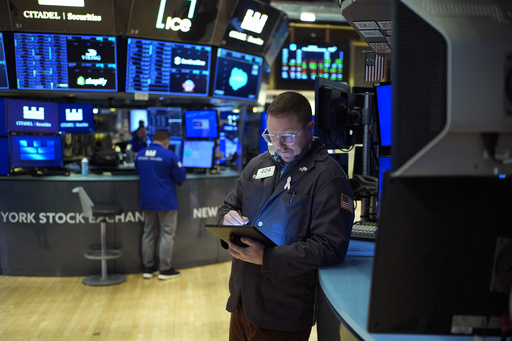
NEW YORK – Market fluctuations characterized Wall Street on Monday, with sharp declines noted in stock prices as global markets reacted to fears of a burgeoning trade war ignited by President Donald Trump’s tariffs.
By midday, the S&P 500 had decreased by 0.6%, following steeper losses in Asian and European stock indices. The Dow Jones Industrial Average saw a minimal decline, down 39 points or 0.1%, as of 11:45 a.m. Eastern, while the Nasdaq composite experienced a 1% drop.
Initially, U.S. markets braced for heavier losses, with the Dow plummeting 665 points shortly after market opening, showcasing concerns about the adverse effects of tariffs on American companies. Technology giants and firms most vulnerable to increased interest rates resulting from these levies were hit particularly hard.
However, losses moderated after Mexican President Claudia Sheinbaum announced a one-month hold on tariffs on Mexican goods following a dialogue with Trump.
Concerns remain that Trump’s tariffs may elevate costs for everyday items like groceries and electronics, potentially reigniting inflation that had been easing since its peak three years ago. If inflation remains stubbornly high, it could complicate the Federal Reserve’s ability to further reduce interest rates after initiating cuts in September aimed at stimulating the economy.
Prior to Monday’s open, many on Wall Street hoped that Trump’s tariff chatter during his presidential campaign was merely a negotiation tactic rather than a prelude to action. However, traders were disheartened to see the implementation of tariffs, raising fears of a detrimental trade war impacting global economies, including the U.S.
This sentiment prompted traders to lower their expectations regarding any additional Federal Reserve rate cuts for the year. Reductions in interest rates typically promote increased hiring by employers and inflate investment prices; however, they may also contribute to higher inflation rates.
Brian Jacobsen, chief economist at Annex Wealth Management, noted that residents in the Midwest might experience the repercussions of a trade war sooner, particularly due to the significant volume of crude oil transported from Canada. He remarked, “Our refiners can’t easily switch away from Canadian crude.”
Crude oil prices experienced volatility on Monday. Benchmark U.S. crude initially surged to over $74.50 per barrel before retreating to $72.36, marking a 0.2% decline, following Mexico’s tariff announcement.
Trump cautioned that American consumers might endure “some pain” due to tariffs, which he characterized as a necessary step to restore national greatness. He also indicated over the weekend that import taxes are anticipated with both the European Union and possibly the United Kingdom.
Many investors on Wall Street are doubtful about the duration of a potential trade war, particularly considering Trump’s attentiveness to stock market performance. An escalation in trade conflict can trigger sharp market downturns, as seen on Monday morning, leading to “significant stock market volatility that could influence policy approaches,” stated Solita Marcelli, chief investment officer for America at UBS Global Wealth Management.
Notably, Constellation Brands, the distributor of Modelo and Corona beers in the U.S., experienced a 2.9% drop in stock value. Best Buy, known for its wide range of electronics, faced a 2.8% decline, while Brown-Forman, which sells Jack Daniel’s whiskey in Canada, fell by 3.2%.
Instead of directing investments into stocks or cryptocurrencies, market players pivoted towards long-term U.S. government bonds, considered safe havens. This shift led to a rally in bond prices, subsequently lowering Treasury yields.
The yield on the 10-year Treasury note declined to 4.51%, down from 4.55% from late Friday. This marks a temporary respite for investors as they navigate rising yields in recent months, driven by concerns over Trump’s tariffs and the higher interest rates they might provoke.
Conversely, short-term Treasury yields rose as market expectations for additional Federal Reserve rate cuts diminished. The yield on the two-year Treasury climbed to 4.23% from 4.21%.
Rising yields exert pressure on multiple investment types but weigh particularly heavily on stocks regarded as overvalued. This situation draws attention to companies like Nvidia, a significant player in the artificial intelligence sector, whose shares dropped 2.6%, heavily impacting the S&P 500’s performance.
Such AI companies faced pressure last week following announcements from a Chinese firm claiming to have developed a large language model rivaling U.S. competitors without relying on high-cost chips.
Trump’s tariffs dominated headlines during a week when more typical market-moving events were expected, such as the upcoming labor statistics report detailing hiring figures from the previous month and numerous profit disclosures from significant firms like Alphabet and Amazon.
In international markets, indices fell across the board: London’s index decreased by 1.1%, Paris dropped 1.3%, and Frankfurt saw a 1.5% decline. In Asia, South Korea’s Kospi index tumbled by 2.5%, while Japan’s Nikkei 225 dropped by 2.7%.

